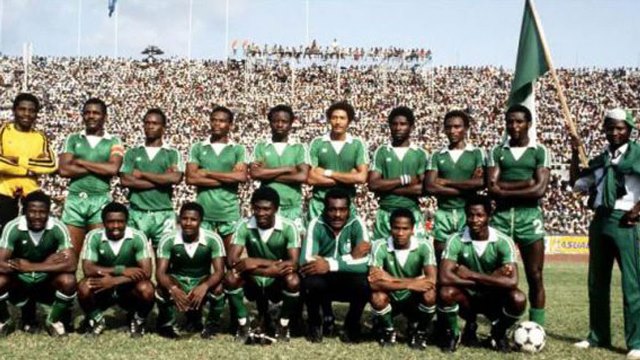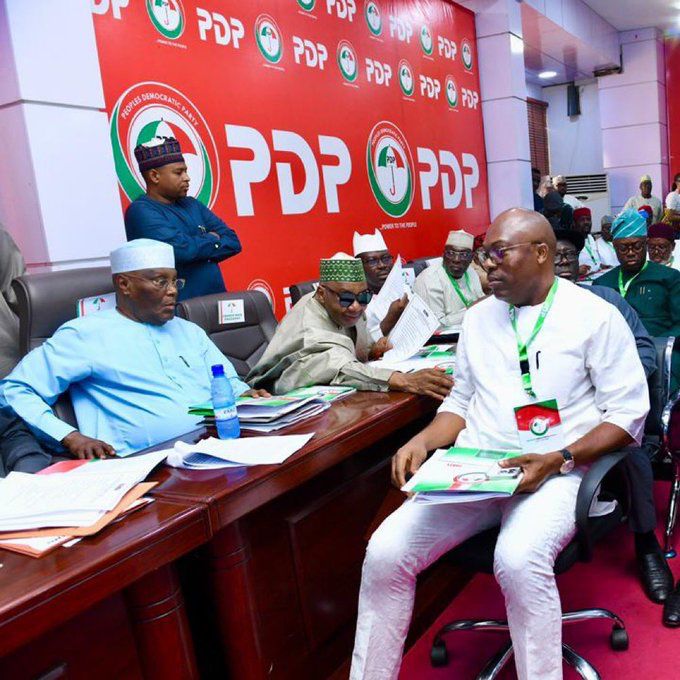By Segun Odegbami
The ‘Chief Justice’ of Nigerian football, distinguished legal luminary and Member of the Order of the Niger (MON), Chief Adokie Amiesimaka was the one who called me up and reminded me it was 38 years to the day on March 22 that a group of young Nigerian footballers won the African Cup of Nations for their country for the first time and created history.
He told me he was celebrating the team in his own way, and was calling up all those he could reach to extend his handshake and a token gift in appreciation and demonstration of how well the Lord has blessed him.
He was graciously extending his ‘token’ support to my school in Wasimi. Within an hour of his call he kept his promise and gave the school what I can only publicly reveal with his consent.
It was a sobering moment indeed. It unleashed memories that raced through my mind.
It is by the Grace of God that we are alive in this wilderness of daily, known and unknown dangers that lurk in every corner of our country and our lives.
Adokie came up with an idea for us to establish a Foundation to cater to the needs and challenges of the less privileged amongst us and amongst the generations of the footballers after. The foundation will provide ‘fishing’ skills rather than fish itself for those in need. Of course, I am game.
So, do not be surprised if in the next few weeks, or months, we launch out on such a project to make a difference applying the gifts and opportunities that God has blessed us with to bless others.
Permit me to recall the members of that 1980 team in my own humble celebration.
(1.) Best Ogedegbe. Late and resting with the Lord. Brave, and almost ‘arrogant’ in the uncommon level of his confidence in goal. He was almost as good a field player as he was a goalkeeper.
(2.) Emmanuel Okala. ‘Man Mountain’. Tall, agile, and imposing. His best training was ensuring that the Eagles’ best strikers never scored him in training. He is alive but, like all of us, facing the consequences of the stresses and strains we put on our bodies as players.
(3.) David Adiele. Alive. Now lives in Houston, Texas. Enigmatic. Streetwise. Still doing his ‘thing’, hustling in the US and doing very well.
(4.) Johnny Orlando. Alive. Shuttling between Ghana, where he came from, and the USA where he settled in after the Nation’s Cup. No one can explain how he got into the Nigerian national team and played as well as he did.
(5.) Sylvanus Okpala – Alive. ‘Quick Silver’. One of the younger players in the team – strong headed, versatile, all-round player, very hard, very confident on the ball, and a great shot. He rose through the ranks from the junior national team where he was captain. One of the early Nigerian professional players to Europe. Played in Portugal.
(6.) Okey Isima – Passed on. Another early export to the professional ranks in Portugal. He was that good. Don’t quite understand how and why he was converted from his attacking midfield role to a left full back even though he was right footed.
(7.) Mudashiru Babatunde Lawal – too young to have passed on even before the dust of 1980 had settled. He was so good he was the first African player to go to the African Cup of Nations five times; Nigeria’s first official football Ambassador; First Nigerian athlete to be awarded two national honours; One of the best all-round midfield players to don the national colours of Nigeria.
(8.) Alloysius Atuegbu – Passed on. ‘Block Buster.’ Endless running and tireless worker in the centre of the midfield, with the additional gifts of a great shot and short passing skills.
(9.) Henry Nwosu – Alive and surviving in the turbulent and uncertain world of Nigerian coaching. The youngest in the team at the time, with such prodigious skills he could have played for any team in the world. ‘The youngest Millionaire’. Played professional football briefly in Africa during the twilight years of his career. Midfield general in the true sense.
(10.) Ifeanyi Onyedika – Alive. One of the younger players. A great centre-forward with silky skills and sharp reflexes in the crowded box of opposing goals. A quick thinker. I still do not understand why he did not last for a lot longer in the national team.
(11.) Adokie Amiesimaka – Alive. ‘Chief Justice.’ The fleet-footed master of the dribble. Right footed player that mastered playing from the left wing, a system that is now sweeping global football. Graceful and elegant on the ball. Added intellectual depth to his football, always thinking, always creating as he dances and meanders through defenses with such consummate ease. Great crosser of the ball.
(12.) Tunde Bamidele – Passed on. A cool and calculative player in the heart of Nigeria’s defense. His effectiveness was made less apparent because he shared the same space with the great ‘Chairman’ Chukwu. He was the hard-tackling destroyer and hatchet man whilst Chukwu cleared the mess of his tackles.
(13.) Kadiri Ikhana – Alive. A very versatile, effective hardworking player. Not one ounce of flamboyance in his game. Did the dirty work of keeping dangerous players quiet. ‘Kawawa’, very wise, with a sharp mind. He became one of the most respected and most successful coaches in domestic football in Nigeria.
(14.) Godwin Odiye – Alive. Living a quiet life in the US with an unfortunate ‘scar’ on a great footballing career that was truncated with his move to the US at a young age. Hard, stylish, very fast and dependable defender. He is doing well developing young football talents… for America.
(15.) Shefiu Mohammed – Alive. He is struggling to survive in the hard and harsh environment of Taraba State in Nigeria, away from the glare of stardom and celebrity. Great running and tackling defensive midfield player. A pest to opposing attackers. Not finding life after football easy at all.
(16) Martin Eyo – Passed on. An academic and football player. At any other time but when he appeared on the football scene he would have been better known. Against the array of regular first team attackers in the national team, he became a fringe player. But he was effective whenever he was called upon to add some pep. Fast, strong, good with both feet and had a unique dribbling style.
(17) Frank Nwachi – Alive – Did not play any match during the Championship. One of the players with a degree in the national team. Left for the US shortly after the Nations Cup, and has shuttled between the two countries ever since.
(18.) Charles Bassey – Alive and doing well in Calabar where he was discovered in the great Rovers team of the late 1970s and to where he returned and has remained ever since. Very good player with one of the best shots at goal in the team, but remained on the fringes because of the sea of other exceptional talent.
(19) Moses Effiong – Alive and kicking in Calabar. Third Goalkeeper in the team. Very quiet on and off the field. He was such a gentleman the football fraternity hardly ever remembers him. He stood little chance with Best and Okala in the same team with him, but a great goalkeeper nevertheless.
(20) Felix Owolabi – Alive. ‘Owoblow’. What does one say about this great player who plays like a one-man army? It does not matter where he played on the field, he covered more ground than most others, attacking, defending, marking, shooting, and was felt everywhere on the field. He was like a tornado, unstoppable.
(21) Christian Chukwu – Alive. ‘Chairman’. The great Chairman was true legend. Majestic and dominating in the defense. A true libero and leader on the field. His actions spoke more than words. Very calculative, immaculate passing skills over long distances, a great shot from incredible distances and a man who led by physical example. He was a born captain, respected and loved by all. He coached and managed different national teams at different times. Slowed down now by arthritis – the ailment of retired footballers.
(22) Segun Odegbami –‘Mathematical’. He was just one of the boys in a great squad that made history. He played his part.
Please put us all– the living and the dead – in your thoughts and prayers.
Culled from TheGuardian Photo Credit: FCNaija

 News6 years ago
News6 years ago
 Featured6 years ago
Featured6 years ago
 Boss Picks6 years ago
Boss Picks6 years ago
 Headline6 years ago
Headline6 years ago
 Headline6 years ago
Headline6 years ago
 Headline5 years ago
Headline5 years ago
 Headline6 years ago
Headline6 years ago
 Headline6 years ago
Headline6 years ago













